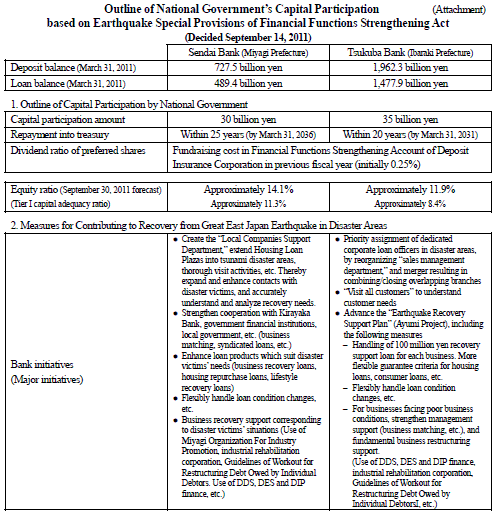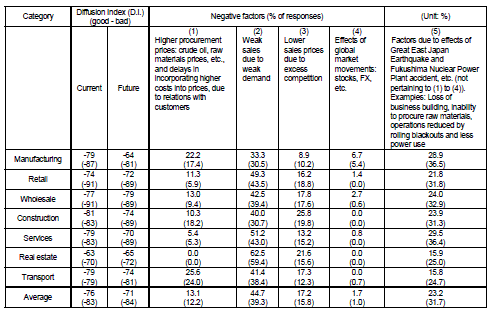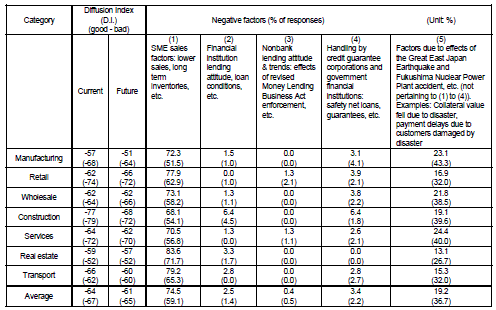 |
 |
| Minister for Financial Services Shozaburo Jimi gives instructions to staff (September 6) |
Minister for Financial Services Shozaburo Jimi (right) presents banking business license to Toshio Kato, President of The Kitakyushu Bank, Ltd. (left) (September 16) |
[Photo Gallery]
* This section posts photos of events attended by the Minister, Senior Vice Minister and Parliamentary Secretary, to provide information.

Senior Vice-Minister Ikko Nakatsuka gives instructions to staff
(September 6)

Parliamentary Secretary Hiroshi Ogushi gives instructions to staff
(September 6)
It has been a half a year since the Great East Japan Earthquake.
We would like once again to offer our sincere condolences to the families and friends of the people who lost their lives in the Great East Japan Earthquake, and express our heartfelt sympathy to the people who suffered damage from the disaster.
The FSA continues to provide “Great East Japan Earthquake - Related Information” via these contact points:
-
FSA web site
-
Great East Japan Earthquake - Related Information
(URL:http://www.fsa.go.jp/en/ordinary/earthquake201103.html)
-
Contact points of financial institutions
(URL:http://www.fsa.go.jp/ordinary/earthquake201103/20110325-1.html) (Available in Japanese only)
-
|
 |
-
FSA Twitter - Information related to the FSA (URL: http://twitter.com/#!/fsa_JAPAN) (Available in Japanese only)
[Topics]
The Multiple Debtors Countermeasures Headquarters![]() established in the Cabinet organizes the Campaign for Enhanced Consultation for Multiple Debtors from September to December each year, jointly sponsored by the Japan Federation of Bar Associations, the Japan Federation of Shiho-Shoshi Lawyer's Associations, and the Japan Legal Support Center. These are free consultation meetings for multiple debtors, held at local governments throughout Japan.
established in the Cabinet organizes the Campaign for Enhanced Consultation for Multiple Debtors from September to December each year, jointly sponsored by the Japan Federation of Bar Associations, the Japan Federation of Shiho-Shoshi Lawyer's Associations, and the Japan Legal Support Center. These are free consultation meetings for multiple debtors, held at local governments throughout Japan.
In order to use regulation of lenders to reduce the creation of new multiple debtors, the Amended Money Lending Business Act was completely enforced starting on June 18 last year. Looking at the current situation after its complete enforcement, compared to when multiple debt problems became a big problem in 2007, there was a decrease in the number of people with five or more unsecured non-guaranteed loan balances from money lending businesses. But continued work is needed on the issue of rebuilding the lives of multiple debtors.
Therefore, this year, the FSA will again hold its “Campaign for Enhanced Consultation for Multiple Debtors 2011” from September to December. This will especially provide consultation for businesses, and explain the safety net system for rebuilding lives.
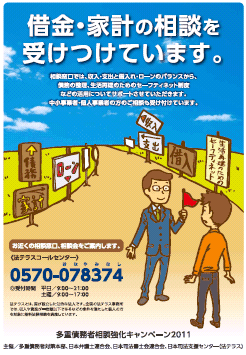
(Campaign Publicity Poster)
During this campaign, consumers and business operators were provided free consultation meetings by prefectures, bar associations, Shiho-Shoshi Lawyers' Associations, small and medium enterprise organizations (Note), and Local Finance Bureaus in the prefectures.
Call the phone number below for guidance to the consultation contact points in each region, and to free consultation meetings held in each region during the campaign.
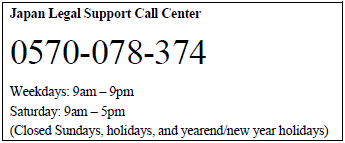
Please never borrow money from loan sharks. Also, never use any services which convert available credit on your credit card. These high interest rates make the loans grow fast, and put you under harsh collection psychological pressure.
Note: These small and medium enterprise organizations are chambers of commerce, societies of commerce, and prefectural federations of small business associations throughout Japan.
* For details, please go to the FSA's web site and access the “Campaign for Enhanced Consultation for Multiple Debtors 2011 - Planned Consultation Events” (September 21). (Available in Japanese only)
On September 30, 2011, the FSA published “FY2012 Request Items for Tax Revisions” and submitted it to the Ministry of Finance and the Ministry of Internal Affairs and Communications. “FY2012 Request items for Tax Revisions” consists of items related to support for recovery from the Great East Japan Earthquake, urgent measures to improve the foundations of the financial and capital markets, and other technical items. The main items are as follows.
1. Support for Recovery from the Great East Japan Earthquake (recovery support with private sector funds used by local governments in disaster areas)
- Registration and license tax exemption on land trusts the settlers of which are local governments, etc.
- Addition of Japanese version of revenue bonds to Japanese Bond Income Tax Exemption Scheme, etc.
2. Urgent Measures to Improve the Foundations of Financial and Capital Markets
- Expansion of the scope of profit/loss offset for financial instruments
- Enhance convenience and simplification of tax exemption for small investments in listed shares
- Change of principles of international taxation (from “force of attraction rule” to “attribution rule”)
In addition to the above, The FSA requested 13 technical items.
* For details, please go to the FSA's web site and access “FSA's FY2012 Request for Tax Revisions” (September 30) at the Press Releases section. (Available in Japanese only)
FSA Disclosure System Working Group; Legal Expert Study Group Report
~ Issue between the Equal Treatment Rule among Shareholders in Japan and Foreign Securities Regulations regarding Rights Offerings ~
The “Act on Partial Revision of the Financial Instruments and Exchange Act for Strengthening the Foundations of Capital Markets and the Financial Industry” (2011 Act No.49) was enacted on May 17 and proclaimed on May 25, 2011. This revision aims to develop the disclosure system from the viewpoint of facilitating the use of rights offering (capital increase by allotment of share options without contribution).
To facilitate the use of rights offering, some issues have been pointed out, such as the development of the legal system under the Financial Instruments and Exchange Act, and the issue regarding foreign securities regulations. It has been pointed out that imposing restriction on the exercise of rights by foreign resident shareholders (to avoid excessive application of foreign securities regulations) could conflict with the equal treatment rule among shareholders under the Japanese Companies Act. To discuss this issue, the FSA established the Legal Expert Study Group (chaired by Prof. Hiroyuki Kansaku, University of Tokyo Graduate Schools for Law and Politics). The Study Group discussed the issue and published its report on September 16, 2011.
The report says that the following conditions should be considered in order to interpret that Exercise Restriction does not conflict with the equal treatment rule among shareholders:
- Necessity to use rights offering as a tool of capital raising
- Properness in relation to interests of certain foreign shareholders.
Based on the content of this report, it is expected that related parties will facilitate the practices of rights offering and that rights offering will become one possible choice for companies to raise capital in the Japanese market.
* For details, please go to the FSA's web site and access “FSA Disclosure System Working Group, Legal Expert Study Group Report ~ Issue between the Equal Treatment Rule among Shareholders in Japan and Foreign Securities Regulations regarding Rights Offerings ~” (September 16) at the Press Releases section.
Based on special provisions for financial institutions affected by the Great East Japan Earthquake of the “Act on Special Measures for Strengthening Financial Functions” (hereinafter referred to as the “Financial Functions Strengthening Act”), the national government decided on September 14 to take capital participation in Sendai Bank and Tsukuba Bank. An outline of this capital participation is explained below.
Regarding the Financial Functions Strengthening Act, considering that the Great East Japan Earthquake could have various effects on financial institutions, in order to
- maintain and strengthen area financial functions in the region, and
- create a complete framework to build confidence among depositors,
the “Draft Act for Partial Revision of the Act on Special Measures to Strengthen Financial Functions to Enhance the Business Foundations of Financial Institutions in Response to the Great East Japan Earthquake, and of the Act on Special Measures for Promotion of Organizational Restructuring of Financial Institutions” was decided in the Cabinet on May 27, 2011. It was submitted to the 177th ordinary session of the Diet, passed through debate in the Diet, was enacted on June 22, and proclaimed on June 29. After that, Cabinet Orders and Cabinet Office Ordinances related to the revised act went through a public comment process from July 11 to 15. The related Cabinet Order was decided in the Cabinet on July 26, and was proclaimed on the same date along with the related Cabinet Ordinance. The revised act was enforced on July 27.
Main Points of Revised Act, etc.
- Special provisions were created. For example, the requirements for applying capital participation by the national government were made more flexible: they do not require the creation of a business strengthening plan which establishes management responsibility and sets targets for profitability and efficiency. Also, capital participation cost was reduced to a level lower than that required in normal times.
- A special provision was created: For cooperative structured financial institutions with financial conditions which are difficult to forecast, national government and central institutions can take joint capital participation.
- The deadline for applications for capital participation by the national government was extended by five years for the entire system (until March 31, 2017).
* For details, please go to the FSA's web site and access “FSA Related Bills in the 177th Diet” at the Bills Submitted to Diet section.
Also, for Cabinet Orders and Cabinet Office Ordinances related to the revised act, please go to the FSA's web site and access “Draft related Cabinet Orders and Cabinet Office Ordinances to accompany enforcement of the ‘Act for Partial Revision of the Act on Special Measures to Strengthen Financial Functions to Enhance the Business Foundations of Financial Institutions in Response to the Great East Japan Earthquake, and of the Act on Special Measures for Promotion of Organizational Restructuring of Financial Institutions’ - Results of public comments, etc.” (July 26, 2011), and “Draft Partial Revision of ‘Comprehensive Guidelines for the Supervision of Regional Financial Institutions’ - Results of public comments, etc.” (July 26, 2011) at the Press Releases section.
(Both available in Japanese only)
Based on the revised law, the FSA examined the “Business Strengthening Plans” submitted by Sendai Bank and Tsukuba Bank. After hearing the opinions of the Examination Board on Strengthening of Financial Function, on September 14 it decided on capital participation. An outline of the “Business Strengthening Plans” of both banks is shown in the attachment.
The dividend ratio (capital participation cost) of preferred stock issued by both banks were reduced to be the same level of fundraising cost as for the previous fiscal year's Financial Functions Strengthening Account of the Deposit Insurance Corporation of Japan (initially 0.25%). This was done because the national government's capital participation aims at dramatic strengthening of their financial functions, and at smooth provision of funds for reconstruction of the businesses and lives of victims of the Great East Japan Earthquake, and to enable them to actively and continually contribute support for recovery and reconstruction of disaster areas.
In addition to these two banks for which capital participation was decided, if management of a financial institution judges that capital reinforcement would be appropriate, then the FSA hopes that it will actively investigate use of the Financial Functions Strengthening Act. The FSA plans to continue to encourage active investigation of use of this Act.
* For details, please go to the FSA's web site and access “Decision on capital participation in The Sendai Bank, Ltd. and Tsukuba Bank, Limited” (September 14) at the Press Releases section. (Available in Japanese only)
Business Sentiment etc. of Small and Medium-sized Enterprises - Questionnaire Survey Results Summary
As part of its ascertaining the actual situations of small and medium enterprise finance, the FSA performed an interview survey via local finance bureaus throughout Japan in August 2011, covering 47 chambers of commerce and industry, one for each of Japan's prefectures. Questions included those about the current and future business sentiment and cash flow of member enterprises, currently and in the future. A summary of the survey results is provided below.
1. There was continued harsh business sentiment among small and medium enterprises. The current diffusion index was less negative than the previous survey.
The negative factor with the largest percent was “Weak sales,” followed by “Other effects due to the earthquake, etc.”
Note 1: D.I. = (percent of respondents who replied “Good”) - (percent of respondents who replied “Bad”)
Note 2: Multiple replies are possible for negative factors, and the ratio is shown with the total of multiple replies as denominator.
Note 3: Figures in parentheses are results of the May 2011 survey.
2. Cash flow of small and medium enterprises also continues to be in a harsh situation. The current diffusion index is slightly less negative than in the previous survey.
The negative factor with the largest percent was “Small and medium enterprise sales factors,” followed by “Other effects due to the earthquake, etc.”
Note 1: D.I. = (percent of respondents who replied “Good”) - (percent of respondents who replied “Bad”)
Note 2: Multiple replies are possible for negative factors, and the ratio is shown with the total of multiple replies as the denominator.
Note 3: Figures in parentheses are results of the May 2011 survey.
Reference: Below are the main comments on business conditions related to the Great East Japan Earthquake.
Manufacturing Industry
- We repaired and replaced machinery that was damaged or washed away, and we see that orders from parts manufacturers are returning to pre-disaster levels (Miyagi Prefecture)
- We recovered from the problems immediately after the earthquake, but we have not returned to pre-disaster levels. There are also radiation problems and electricity conservation actions, so we are anxious about the future (Fukushima Prefecture)
- The supply chain disruptions after the earthquake are just ending now, but conditions continue to be harsh overall (Yamagata Prefecture)
- Due to recovery of supply chains, orders received have increased, and we can see a recovery trend (Tochigi Prefecture)
- There are fewer parts shortages due to the effects of the earthquake, but we have not recovered to pre-disaster levels. Raw material prices have risen overall, which is a factor putting pressure on profits (Yamanashi Prefecture)
- Our supply aspect is restricted by parts procurement difficulties caused by the earthquake. We are also affected by stagnant demand. Thus business conditions are harsh (Toyama Prefecture)
- The earthquake caused a decrease in orders received for automotive related parts and equipment for manufacturing. We see a partial recovery trend, but demand and sales continue to be weak overall (Kyoto Prefecture)
- The material and equipment shortages after the earthquake have been resolved somewhat, and order volume is in a growth trend (Saga Prefecture).
- Fast recovery of supply chains has relieved the effects of the earthquake, but high oil prices and the yen's appreciation are reducing profitability (Oita Prefecture)
Retail Industry
- Concerns about damage by radiation rumors (rice, meat, etc.) cause anxiety, but we don't think we will see large changes in the future (Iwate Prefecture)
- Damage by rumors is holding us back. Stagnant demand is reducing selling unit prices, so we can't predict the future (Fukushima Prefecture)
- Electricity conservation products are selling well, and customers are returning to convenience stores. So there are some factors turning favorable. The self-restraint mood and thrifty attitude caused by the earthquake are steadily relaxing, and we are nearing pre-disaster conditions (Aomori Prefecture)
- People's hesitancy to buy after the earthquake is relaxing, but we can only sell low priced things, so each unit price is low, and it is not leading to sales growth (Akita Prefecture)
- There is sales growth at home electronics retailers who deal in electricity conservation related products. Sales decreased at food retailers, because of concerns about radiation contamination. So we see variation in results (Tochigi Prefecture)
- Due to effects of electricity conservation, there is growth in sales of home electronics like energy saving air conditioning and fans. Cool Biz related products are also selling well (Gunma Prefecture)
- Demand continues to be weak, except for energy conservation related products. Fresh foods have been especially hurt by rumors about the nuclear power accident (Yamanashi Prefecture)
- Product shortages caused by the earthquake are steadily being resolved, but demand continues to be weak (Yamaguchi Prefecture)
- The self-restraint mood caused by the earthquake has relaxed a lot, but the prolonged recessionary mood continues to restrain consumption, so sales aren't growing (Nagasaki Prefecture)
Wholesale Industry
- Distribution, orders placed and orders received have recovered, so sales are recovering, but levels are flat (Iwate Prefecture)
- The earthquake reduced business with retail shops and restaurants, so we see fewer orders and there is price competition (Miyagi Prefecture)
- The self-restraint mood and thrifty attitude caused by the earthquake are relaxing, so we are nearing pre-disaster conditions (Aomori Prefecture)
- Manufacturers on the Pacific coast had sudden drops in production and halts to distribution. Those effects have been mostly resolved, and orders received are partly returning to pre-disaster levels (Yamagata Prefecture)
- We are worried that agricultural products business will be even more damaged by rumors about the nuclear accident (Ibaraki Prefecture)
- The self-restraint mood after the earthquake has improved, but we are far from pre-disaster conditions, with fewer orders received related to events held (Kanagawa Prefecture)
- There is steady increase in demand related to recovery from the earthquake, and there is a stronger feeling of expectations that conditions will improve (Nagano Prefecture)
- Due to recovery demand, there is increased demand for tools used in construction of roads and buildings (Kagawa Prefecture)
- Due to effects of the earthquake, there are continuing conditions of materials shortages and higher procurement prices (Fukuoka Prefecture)
- Consumer self-restraint is causing poor results at retail shops. Due to the earthquake, it is hard to get products from suppliers (food manufacturers) (Okinawa Prefecture)
Construction Industry
- Some companies are receiving strong orders for construction of temporary housing in disaster areas, but orders received for private and public construction are not increasing overall (Iwate Prefecture)
- Due to increases in housing sales and remodeling construction, etc., the industry is starting to look active overall (Miyagi Prefecture)
- Repair of buildings damaged by the earthquake and construction of temporary housing are making up for the decrease in new building construction (Fukushima Prefecture)
- Due to the effects of the earthquake, it is hard to buy some materials and equipment. These are being replaced by alternative products in some cases, and we also hear of construction delays (Hokkaido)
- There is an increase in some construction related to recovery: electrical, water supply, etc. (Yamagata Prefecture)
- Some recovery-related construction is on an increasing trend, but procurement of construction materials and equipment and their high prices still tend to be worse (Tochigi Prefecture)
- Due to the effects of the earthquake, there are shortages of construction materials and equipment, and construction schedules are being interrupted. We are surviving by getting materials and equipment from multiple suppliers (Hiroshima Prefecture)
- The earthquake made it hard to get construction equipment and materials. That situation is solved, but we are getting fewer orders and are less profitable, so conditions are still harsh (Ehime Prefecture)
- Difficulties in material and equipment procurement were seen immediately after the earthquake. That situation is steadily improving, but the demand aspect is still stagnant (Kumamoto Prefecture)
- Due to the earthquake, budgets have been cut for public construction, except for that related to earthquake recovery. We expect public construction to decrease even more, so we don't expect a recovery in business conditions (Miyazaki Prefecture)
Service Industry
- Hotels, etc. are improving compared to immediately after the earthquake, and are nearing the levels of last year overall (Iwate Prefecture)
- Repairing of shops, etc. damaged by the earthquake has made long-term business closures unavoidable. So we see some businesses with lower sales. Also, the tourism industry has been hurt by rumors about the nuclear accident (Miyagi Prefecture)
- We are hobbled by the nuclear power problems and damage by rumors. There continue to be many cancellations (Fukushima Prefecture)
- Hotels and inns were getting much fewer guests due to the earthquake, but business is picking up due to the Nebuta Festival, etc. Also a big JR campaign is bringing more tourists to the Hirosaki region (Aomori Prefecture)
- The self-restraint mood seen immediately after the earthquake is relaxing, so there is an increase in banquet sales, and accommodation revenues increased with the Inter-high school championships. But conditions are harsh overall, with a big decrease in group travel to sightseeing areas, etc. (Akita Prefecture)
- The earthquake dramatically reduced tourist numbers, which are now steadily recovering, especially in the hotel industry. But they are not reaching pre-disaster levels (Yamanashi Prefecture)
- In the tourism sector, tourist numbers are steadily recovering compared to immediately after the earthquake. But they are not recovering to pre-disaster levels, and there are fewer foreign tourists because of the earthquake and nuclear accident (Kyoto Prefecture)
- The earthquake's self-restraint mood is relaxing, and we see signs of a pickup since May (Shiga Prefecture)
- The self-restraint mood is gone, but accommodation numbers of groups and foreigners have not recovered to pre-disaster levels (Kagawa Prefecture)
- In addition to effects of tourist cancellations in the prefecture after the earthquake, the decrease in tourist groups from overseas is having a large impact (Miyagi Prefecture)
Real Estate Industry
- The prefecture has a housing support policy of renting many private apartments, and providing them as temporary housing for disaster victims. We are starting to see its effects (Yamagata Prefecture)
- Since the earthquake, we see tenants leaving because of concerns about earthquake resistance. In addition to harsher competition, there is an increase in the insecurity factor (Tokyo Metropolis)
- There is an improvement from the decline in market conditions after the earthquake, and we have received many inquiries about single-family homes and apartments (Kanagawa Prefecture)
- Purchasing desire has fallen due to the earthquake and nuclear accident, so conditions continue to be poor (Shizuoka Prefecture)
- After the earthquake, real estate transactions stagnated, and cash flow conditions are harsh (Toyama Prefecture)
- I hear very little about the earthquake's effects, but demand is generally weak (Kumamoto Prefecture)
Transportation Industry
- In coastal areas, the tsunami washed away vehicles, so we saw a decrease in orders received, but we see partial signs of recovery (Miyagi Prefecture)
- Orders received are in a recovery trend, but high fuel prices and other factors are creating a constantly high cost structure, which is putting pressure on business (Fukushima Prefecture)
- There is recovery from impacts on truck transport due to gasoline shortages after the earthquake. But the decrease in tourists is decreasing the volume of gifts handled. We also see effects of weak movement in gifts for midyear, etc. (Yamagata Prefecture)
- Fuel shortages and road conditions immediately after the earthquake have been relieved, and we are receiving more orders to disaster areas, so we see a small recovery trend (Tochigi Prefecture)
- Sales in the passenger transport industry are decreasing due to effects of the earthquake (Saitama Prefecture)
- Supply chain problems caused by the earthquake are solved, and we see almost no effects (Aichi Prefecture)
- After the earthquake, the self-restraint mood spread quickly, causing a decrease in charter buses and highway bus passengers (Tokushima Prefecture)
- Distribution and tourists were affected by the earthquake. These are steadily recovering, but high prices of fuel and other things are making profitability difficult (Kumamoto Prefecture)
* For details, please go to the FSA's web site and access “Business Sentiment etc. of Small and Medium-sized Enterprises - Questionnaire Survey Results Summary” (September 30) at the Press Releases section. (Available in Japanese only)
“Draft Cabinet Office Ordinance for Partial Revision of the Order for Enforcement of the Insurance Business Act, etc.” - Results of public comments, etc.
The FSA widely solicited opinions on the “Draft Cabinet Office Ordinance for Partial Revision of the Order for Enforcement of the Insurance Business Act, etc.” from July 8 to August 8, 2011. Its results, etc. were published on September 6.
This Cabinet Office Ordinance and related regulatory notice were published in the official gazette on September 7, 2011, and will be enforced starting April 1, 2012. Related supervisory guidelines will also applied starting on that date.
An outline of the revision is as follows.
1. Borrower Solicitation Regulations, etc.
-
(1) For certain insurance products, banks shall not obtain fees and solicit insurance to borrowers of business funds (if a small enterprise with 50 employees or less, including its employees, etc.) (Borrower Solicitation Regulations).
This regulation continues to remain in place. However, this regulation does not apply to solicitation of other insurance such as single premium whole-life insurance, single premium endowment life insurance, accumulated injury insurance, and accumulated fire insurance, and business related insurance (only for insurance policyholders which are group companies of the bank etc.).
-
(2) Insurance products subject to Borrower Solicitation Regulations cannot be solicited to loan applicants (Timing Regulation).
This regulation continues to remain in place. However, insurance solicitation to applicants for loans of nonbusiness funds is not subject to this regulation.
-
(3) For regional financial institutions, as special provisions on solicitation of insurance products subject to the Borrower Solicitation Regulations: (a) It is possible to take different measures to substitute for the People in Charge Separation Regulation (Regulation which prohibits solicitation of insurance products subject to the Borrower Solicitation Regulations, by a person who engages in the operation of handling customers regarding loans of funds needed in business), and it is possible to solicit insurance to employees etc. of a borrower which has from 21 to 50 employees. On the other hand, (b) there is a maximum insurance amount for an insurance policy with a policyholder who is a borrower's employee etc. (including employee etc. of a borrower with over 50 employees).
This special provision continues to remain in place. However, if the People in Charge Separation Regulation applies, then the only insurance solicitations subject to the insurance amount restriction shall be those to potential policyholders who are employees etc. of borrowers with 50 or less employees.
2. Measures to Ensure Effectiveness of Measures to Prevent Negative Effects
-
(1) To prevent confusion between insurance products and deposits, there are mandatory explanations in writing and by other methods, and there shall be written confirmation that the customer understands those explanations.
-
(2) Previous customer agreement is required to enable insurance solicitation operations to use undisclosed financial information, but when obtaining such agreement, the bank must make clear its means of insurance solicitation, scope of information to be used, methods to cancel the agreement, etc.
-
(3) When soliciting housing loan related insurance, the bank must explain that this does not affect its other bank transactions etc., and the customer shall be provided with written explanation that purchase of such insurance is not a loan condition.
The FSA continues working to understand the actual status of insurance solicitation by banks, etc. Specific deadlines are not set for future revisions of measures to prevent negative effects. Such revisions will be made as the need arises.
* For details, please go to the FSA's web site and access “‘Draft Cabinet Office Ordinance for Partial Revision of the Order for Enforcement of the Insurance Business Act,’ etc. - Results of public comments, etc.” (September 6) at the Press Releases section. (Available in Japanese only)
Site Map
- Press Releases & Public RelationsPage list Open
- Press Releases
- Press Conferences
- Official Statements
- FSA Weekly Review & ACCESS FSA
- Speeches
- For Financial Users
- Others
- Archives
- Laws & RegulationsPage list Open
- Name of Laws and Regulations(PDF)

- Recent Changes (Legislation, Ordinances, Guidelines)
- Guidelines
- Financial Instruments and Exchange Act
- Financial Monitoring Policy
- Public Comment
- No-Action Letter System
- Procedures concerning Foreign Account Management Institutions







